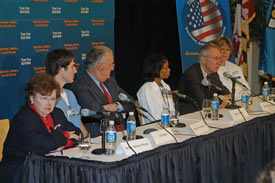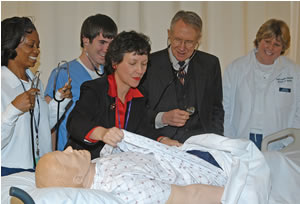
Three U.S. senators—Barbara Mikulski (D-MD), Paul Sarbanes (D-MD), and Democratic Leader Harry Reid (D-NV)—held a panel discussion with three students from the Johns Hopkins University School of Nursing on Thursday, December 8, 2005. The event, Higher Education: America Can Do Better, explored the need for federal student loans and the potential impact of cuts to loan programs.
The senators were joined by Hopkins undergraduate students Chris Reed ’06, Julie Story ’07, and Patrice Pantin ’07, who spoke of the necessity of having federal loans to finance their nursing education. After the panel discussion, the students gave the senators a demonstration of “SimMan,” a patient simulator. Attached to a personal computer and controlled by software, the SimMan manikin can talk, breathe, cough, and even moan.
“We know that you have come into nursing to change lives and to save lives,” Mikulski told the audience of nursing students. “The education that you get should not depend on your family’s income…. Significant cuts to student aid are absolutely unacceptable. I believe that America can do better.”

Some highlights from the panel discussion:
Mikulski: “The opportunity ladder to seek higher education, whether in nursing or any other field, is creaky and shaky.”
Reed: “Coming [to Hopkins], I decided that I didn’t want to work the extreme hours that I did when I was in college… I wanted to participate in student government, I wanted to do internships, I wanted to be able to travel…The federal student loans that I received have enabled me to do a lot of the things I have done.”
Sarbanes: “Everyone ought to have the opportunity to go as far as their talents will take them, regardless of the financial circumstances of the family from which they come.”
Pantin: “Being from a family that was poor, we always had to work really hard. Hard work was always rewarded with grades. Even if you didn’t have money, you could still be the valedictorian of your class.”
Reid: “[Julie Story] pays for her schooling here with the help of the GI Bill. That’s not enough. We need to do better than what we’ve done in the past and what we’re doing now. Is this a time to cut our help to students? The answer is ‘no!’”
Story: “Being an older, non-traditional student who is returning to a full academic program has certainly not been easy. I’ve had quite a bit of difficulty finding funding—federal funding and scholarships—that are specific to nursing education. The Montgomery GI Bill has helped supplement some of those costs, but it’s not enough.”